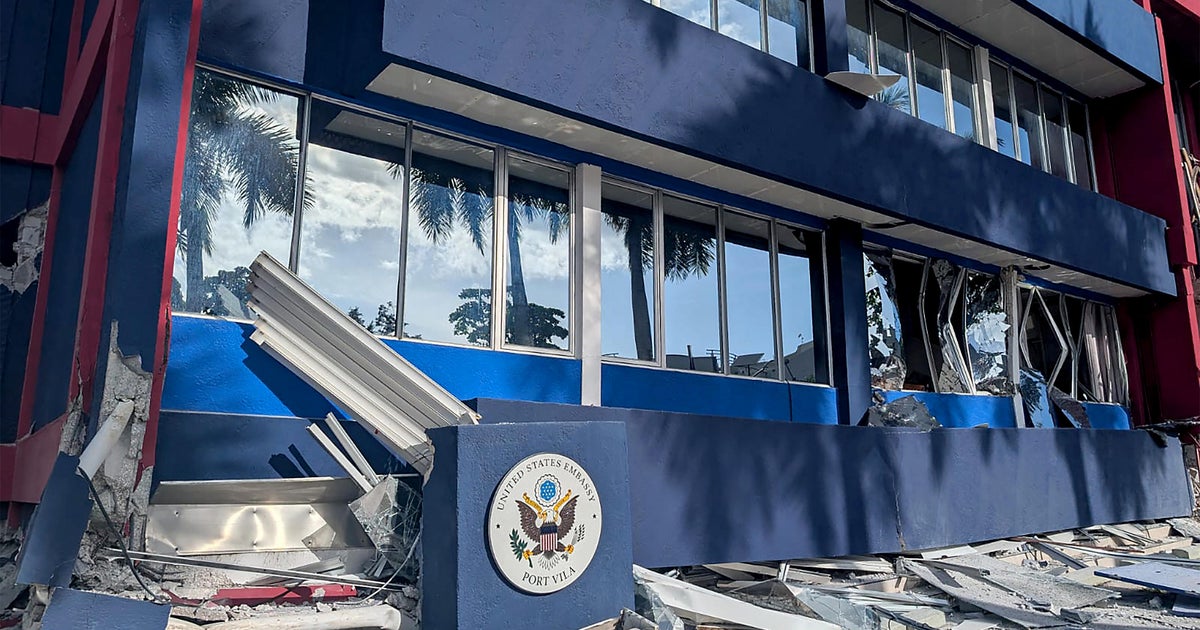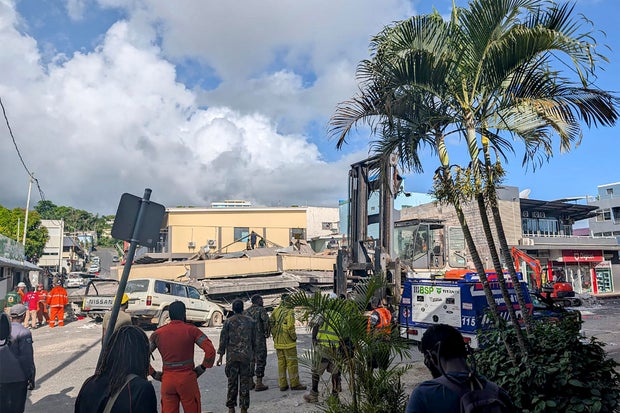CBS News
What to know about RFK Jr.’s stances on key health issues and what he could do at HHS

Robert F. Kennedy Jr., President-elect Donald Trump’s pick to lead the Department of Health and Human Services, is coming into the nomination process in an unusual position: a long list of his own policy priorites separate from the president-elect’s, and a public promise by Trump to let him “go wild” on his ideas.
CBS News medical contributor Dr. Céline Gounder, the editor-at-large for public health at KFF Health News, answers questions below about the role Kennedy has been tapped to take on and some of the ideas in the sweeping “Make America Healthy Again” platform he may try to push through.
Q: What is the role of the Department of Health and Human Services, and how much power does the HHS secretary have over its work?
The U.S. Department of Health and Human Services comprises several agencies and offices including the National Institutes of Health, the Centers for Disease Control and Prevention, the Food and Drug Administration, the Centers for Medicare and Medicaid Services, the Office of the Surgeon General and much more.
There is a big difference between political appointees and career civil servants. Political appointees set strategic priorities and align their department or agency’s policies with the current administration’s objectives. Civil servants have the institutional knowledge to know how to get things done and have specialized scientific or technical expertise. Scientific questions require specialized expertise. This is why there are career scientists who advise the HHS secretary, NIH director, CDC director and FDA commissioner.
The HHS secretary has the authority to establish regulations that govern health, including food and drug safety, public health and health care quality. The HHS secretary can declare public health emergencies and coordinate federal responses to health crises, such as disease outbreaks or natural disasters. The secretary wields significant influence over the department’s policies and its constituent agencies, which include the CDC, FDA, NIH and others.
The HHS secretary is also in a position to shape public opinion if given a platform to do so by the media. Absent media attention, their influence on public opinion is more limited. We in the media have a responsibility to fact-check their statements and hold those in power accountable — regardless of who is in power.
Q: One of Kennedy’s most controversial stances is his his criticism of vaccines, promoting the idea that they cause autism, among other conditions, and claiming “there’s no vaccine that is safe and effective.” What is the reality?
Extensive research has conclusively shown that vaccines do not cause autism. The “research” behind these claims was retracted due to ethical violations and sloppy work. The doctor who originally made those claims lost his medical license as a result of his professional misconduct.
For parents whose kids have autism or people who have autism, this matters. For too long, claims about the safety of vaccines have not only put people at unnecessary risk of getting illnesses that vaccines can prevent, but have also been a red herring, distracting people from the real causes of autism and how to diagnose them and treat them. That distraction is unproductive and harmful.
Secondly, nothing in this world is 100% safe and effective. It’s all about weighing risks, the pros and cons. Is one choice more beneficial or more risky? Do the pros of wearing a seatbelt in the car outweigh the risks? Do the pros of exercising regularly outweigh the risks of not exercising? Do the pros of vaccinating instead of allowing infectious diseases to spread in the community outweigh the cons? Yes, yes and yes.
Q: Kennedy has said he wants to leave it up to individuals to decide whether to vaccinate themselves or their children. What impact could that have?
Increasingly, people are formulating opinions about vaccines based not on science, but on Google searches, social media, what family and friends think and personal observation. That is not research. Research is formulating a hypothesis and trying to disprove that hypothesis. It means you understand how to differentiate correlation from causation. And it means doing repeated experiments to show consistency, not just a chance or random result.
This isn’t a question of whether people are smart or not. But most people don’t have the training, experience and context to objectively assess the pros and cons of vaccination. You wouldn’t want me repairing your car’s transmission or brake system. I’m not stupid, but I have no training or experience in this.
The risk of leaving these decisions to untrained individuals is that these decisions won’t be made on science. They will be made based on emotion and confirmation bias, which is to say, Google searches looking for opinions that line up with your preexisting beliefs or inclinations. This will put kids at risk, and because vaccines protect against transmissible infectious diseases this will put others in the community at risk, especially other kids and people who are immunocompromised.
Q: Kennedy has also said chemicals in food are tied to autism as well as psychotic episodes and depression. What do we know about the connection between food and mental health?
He’s not wrong that there is a relationship between diet and autism as well as diet and mental health. These are areas of ongoing research. No diet has been proven to cure or universally improve autism or mental health symptoms, but certain dietary interventions improve symptoms in some people. These dietary changes may include elimination of ultra-processed foods, eliminating gluten and avoiding certain food additives or preservatives.
Q: Kennedy has said one of the Trump administration’s first acts will be to work to remove fluoride from drinking water, arguing it’s connected to cancer, IQ loss, thyroid disease and other health problems. Why is fluoride in drinking water, and is it safe?
Fluoride is put in the water to reduce the risk of cavities, especially in kids.
As with many things, fluoride safety is all about dose. Drinking a few glasses of water a day is healthy. Drinking a barrel of water would land you in the hospital. The level of fluoride in U.S. water is safe and protects against tooth decay.
When municipalities stopped putting fluoride in the water, cavity rates went up. This was observed, for example, in Calgary and in Juneau, Alaska.
There are parts of the world, including India, China and East Africa, where fluoride levels 30 to 40 times higher than levels in the U.S. have been found to be harmful. But we don’t have anywhere near those levels of fluoride in our water.
But Kennedy’s statement demonstrates a common misunderstanding about public health authorities in the U.S. We are the United States of America — public health powers reside at the state level. The federal government has the authority to tax and spend and to regulate commerce across state lines, but the federal government’s authority does not extend beyond that.
The CDC provides scientific guidance to help state and local authorities to make informed decisions. The CDC does not mandate fluoridation. The EPA sets the maximum allowable fluoride concentration in public water systems. But states have the authority to mandate fluoridation or can leave it up to local jurisdictions.
Q: Kennedy has criticized multiple public health agencies he could now lead. He’s said the FDA’s “war on public health is about to end,” claiming the agency suppresses anything that “advances human health and can’t be patented” by pharmaceutical companies. What do you make of these criticisms?
This again demonstrates a misunderstanding of federal agency authority. Congress has passed laws that give the FDA specific authority to regulate drugs, supplements and food, and those laws grant the FDA different powers over drugs, supplements and food.
Drugs require FDA approval before they can be marketed. Under the law, drugs are defined as substances used to diagnose, treat or prevent disease.
Supplements don’t need FDA approval before they are sold. The FDA monitors dietary supplements once they are on the market and can take action if they are unsafe or if they make claims about diagnosis, treatment or prevention of disease.
Dietary supplement manufacturers often choose not to seek FDA approval to market their products as drugs because:
- There are less stringent requirements on dietary supplements than on drugs
- The FDA approval process is expensive and lengthy. Clinical trials take years to conduct and cost millions of dollars. Manufacturers foot the bill for clinical trials.
- Dietary supplements can be sold directly to consumers without a prescription.
It’s the manufacturer that decides whether it wants to seek FDA approval for a drug or if it wants to market a product as a dietary supplement — and that decision typically comes down to time and money. Pharmaceutical companies are less inclined to invest millions of dollars in clinical trials of unpatented treatments due to the lack of exclusive marketing rights, which can affect profitability.
The FDA often goes after supplement brands that test this line when it sees companies marketing products with claims that amount to what should be regulated as a drug. This is why supplements often carry a disclaimer that they aren’t being sold to “diagnose, treat, cure, or prevent any disease.” Kennedy has praised the supplement industry for “fighting back,” following a court win over an anti-aging supplement that the FDA argued should be regulated as a drug.
Finally, the FDA doesn’t grant patents. That’s the job of the U.S. Patent and Trademark Office.
Q: Trump has said Kennedy will “end the chronic health epidemic.” What are some of the positive actions he could take if he becomes HHS secretary to reduce chronic disease in the U.S.?
Kennedy has called for greater regulation of food additives and ultraprocessed foods. Ultraprocessed foods in American diets have led to an explosion in obesity, diabetes, high blood pressure and other chronic disease.
However, it’s unclear which factions within Trump’s orbit will prevail. Congress would have to give the FDA the authority to be more aggressive in regulating and the funding to enforce regulations. Historically, the Republican Party has been opposed to regulation. Trump’s chief of staff pick, Susie Wiles, is a longtime lobbyist who has worked on behalf of the food, insurance and tobacco industries.
The Heritage Foundation’s Project 2025 — which involved a number of former Trump advisers, but which Trump has tried to distance himself from — would roll back dietary guidelines would make it harder to fight ultraprocessed foods.
contributed to this report.
CBS News
Head of Russia’s nuclear defense forces killed in Moscow blast triggered by device hidden in scooter, officials say

Moscow — The head of Russia’s Nuclear, Biological, and Chemical Defense Forces, Lt. General Igor Kirillov, was killed along with his deputy early Tuesday in an explosion in Moscow, Russia’s Investigative Committee said.
An explosive device hidden in an electronic scooter went off outside a residential building as the two men left the structure, Agence France-Presse cites investigators as saying.
ALEXANDER NEMENOV / AFP via Getty Images
“Investigators, forensic experts and operational services are working at the scene,” committee spokesperson Svetlana Petrenko said in a statement. “Investigative and search activities are being carried out to establish all the circumstances around this crime.”
ALEXANDER NEMENOV / AFP via Getty Images
The committee carries out responsible major investigations in Russia.
Kirillov was sentenced in absentia by a Ukrainian court on Dec. 16 for the use of banned chemical weapons in Ukraine during Russia’s military operation in Ukraine that started in Feb. 2022.
AFPTV / AFP via Getty Images
Ukraine’s Security Service, the SBU, said it had recorded more than 4,800 uses of chemical weapons on the battlefield since February 2022, particularly K-1 combat grenades.
During the almost 3-year operation, Russia has made small but steady territorial gains to the nearly one-fifth of Ukraine it already controls.
Kirillov had been in his post since 2017, AFP notes.
CBS News
Earthquake rocks Pacific island nation of Vanuatu, deaths feared, U.S. embassy damaged

A powerful earthquake hit the Pacific island nation of Vanuatu Tuesday, smashing buildings in the capital, Port Vila, including one housing the embassies of the U.S. and other nations. A witness told Agence France-Presse of bodies seen in the city.
Dan McGarry, a journalist with the Organized Crime and Corruption Reporting Project based in Vanuatu, told the Reuters news agency in an interview that police said at least one person had been killed and injured people had been taken to hospital.
“It was the most violent earthquake I’ve experienced in my 21 years living in Vanuatu and in the Pacific Islands. I’ve seen a lot of large earthquakes, never one like this,” he said.
The 7.3-magnitude quake struck at a depth of 35 miles, off the coast of Efate, Vanuatu’s main island, at 12:47 p.m. local time, according to the U.S. Geological Survey.
The ground floor of a building housing the U.S, French and other embassies had been crushed under higher floors, resident Michael Thompson told AFP by satellite phone after posting images of the destruction on social media.
“That no longer exists. It is just completely flat. The top three floors are still holding but they have dropped,” Thompson said.
“If there was anyone in there at the time, then they’re gone.”
Thompson said the ground floor housed the U.S. embassy, but that couldn’t be immediately confirmed.
A photo showed significant damage to the building:
STR / AFP via Getty Images
The United States has closed the embassy until further notice, citing “considerable damage” to the mission, the U.S. embassy in Papua New Guinea said in a message on social media. “Our thoughts are with everyone affected by this earthquake,” the embassy said.
The New Zealand High Commission, housed in the same building, suffered “significant damage,” a statement from Foreign Minister Winston Peters’ office said, adding that, “New Zealand is deeply concerned about the significant earthquake in Vanuatu, and the damage it has caused.”
Thompson, who runs a zipline adventure business in Vanuatu, said, “There’s people in the buildings in town. There were bodies there when we walked past.”
A landslide on one road had covered a bus, he said, “so there’s obviously some deaths there.”
The quake also collapsed at least two bridges, and most mobile networks were cut off, Thompson said.
“They’re just cracking on with a rescue operation. The support we need from overseas is medical evacuation and skilled rescue, (the) kind(s) of people that can operate in earthquakes,” he said.
STR / AFP via Getty Images
Video footage posted by Thompson and verified by AFP showed uniformed rescuers and emergency vehicles working on a building where an external roof had collapsed onto a number of parked cars and trucks.
The streets of the city were strewn with broken glass and other debris from damaged buildings, the footage showed.
Nibhay Nand, a Sydney-based pharmacist with businesses across the South Pacific, said he had spoken to staff in Port Vila who said most of the store there had been “destroyed” and that other buildings nearby had “collapsed.”
“We are waiting for everyone to get online to know how devastating and traumatic this will be,” Nand told AFP.
A tsunami warning was issued after the quake, with waves of up to three feet forecast for some areas of Vanuatu, but it was soon lifted by the Pacific Tsunami Warning Center.
Earthquakes are common in Vanuatu, a low-lying archipelago of 320,000 people that straddles the seismic Ring of Fire, an arc of intense tectonic activity that stretches through Southeast Asia and across the Pacific Basin.
Vanuatu is ranked as one of the countries most susceptible to natural disasters such as earthquakes, storm damage, flooding and tsunamis, according to the annual World Risk Report.
CBS News
12/16: CBS Evening News – CBS News

Watch CBS News
Be the first to know
Get browser notifications for breaking news, live events, and exclusive reporting.














